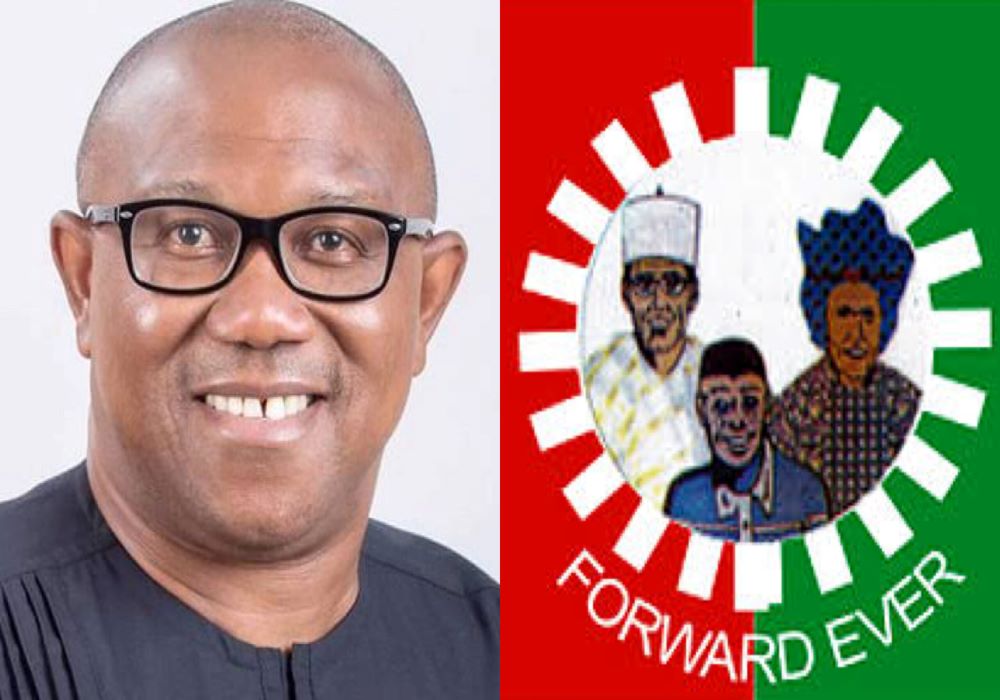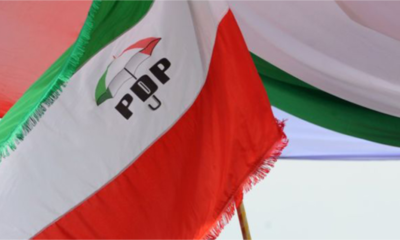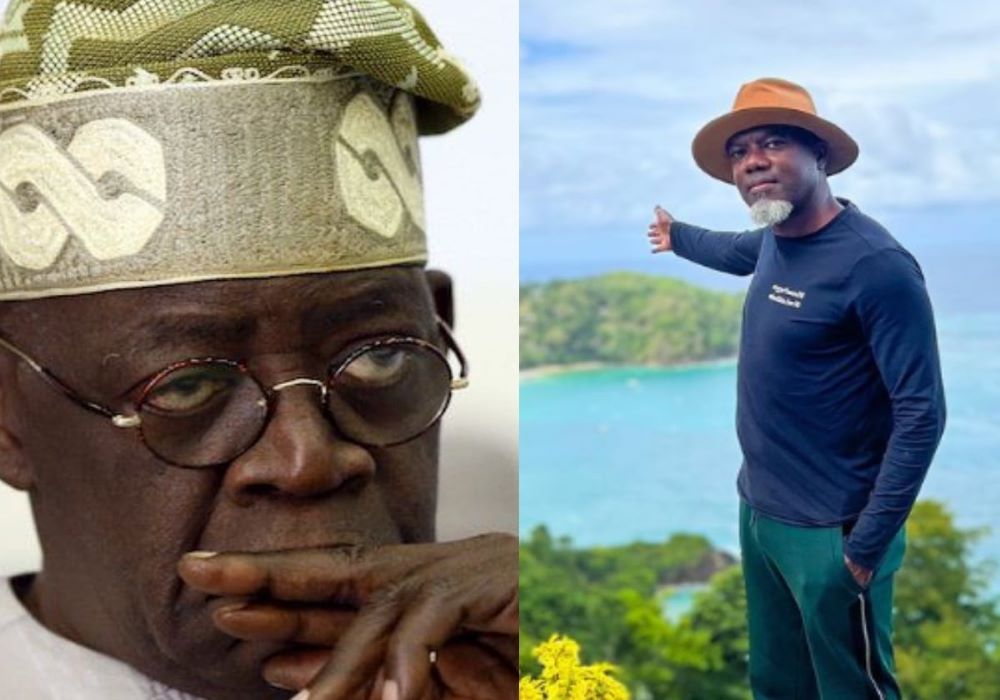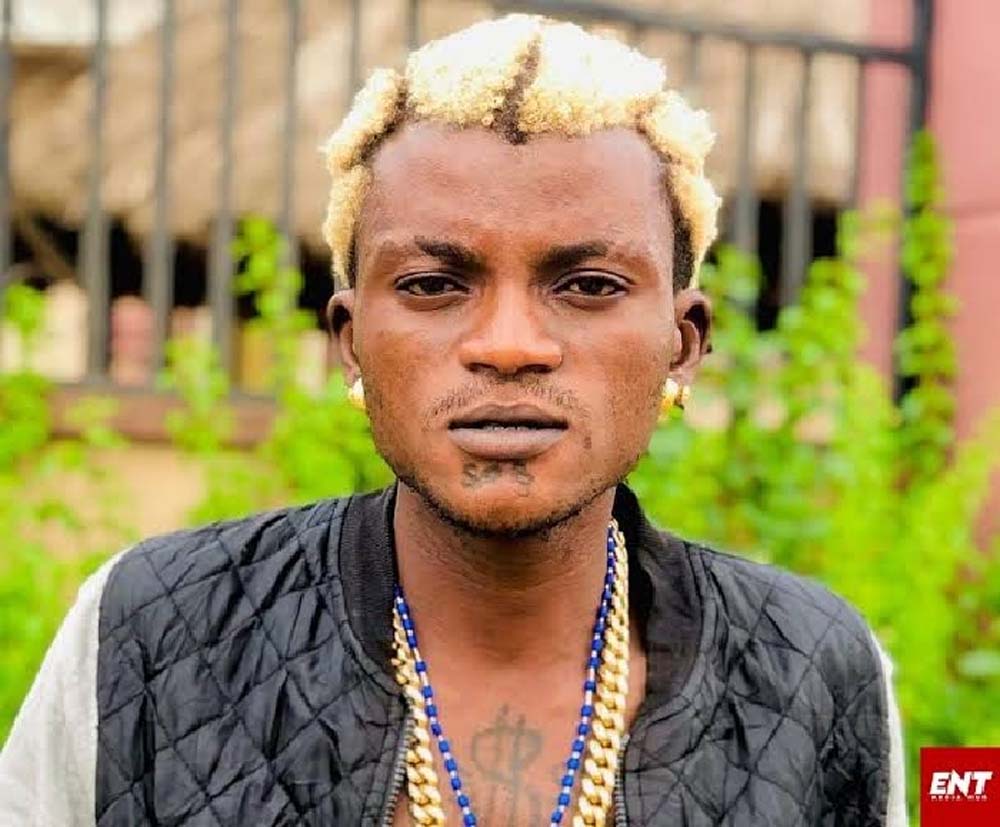Opinion/Feature
Four Biggest Losers Of 2023 Nigerian General Elections
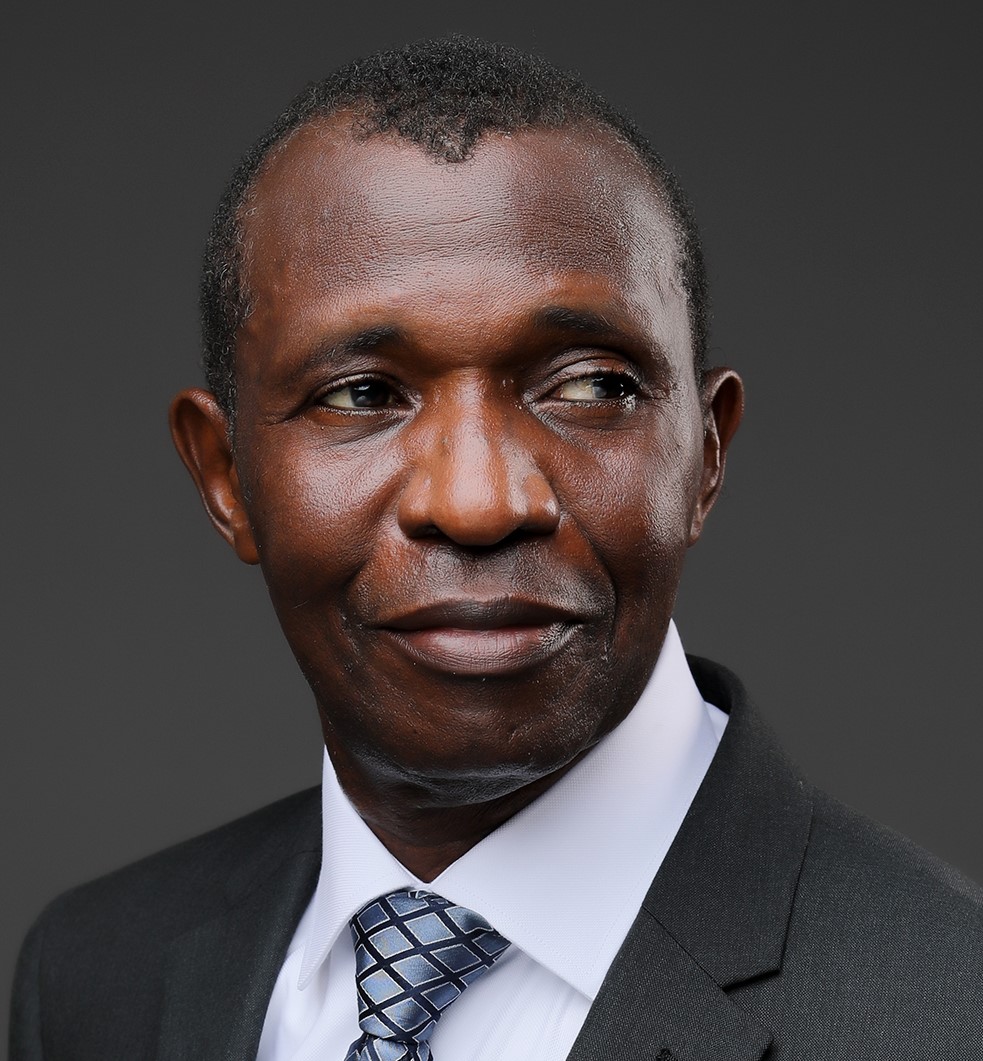
By Michael Owhoko, Ph.D
The real losers of the 2023 Nigerian general elections are not the electorate deprived of their rights to freely choose candidates of their choice nor the first-timer youth disappointed by the Nigerian state nor the candidates who lost or won as declared by the Independent National Electoral Commission (INEC).
The biggest losers are President Muhammadu Buhari, INEC Chairman, Prof. Mahmood Yakubu, President-elect, Senator Bola Ahmed Tinubu, and Nigeria as a political entity. Except for Bola Tinubu who carries the burden of legitimacy arising from flawed processes and total miniature votes garnered, the others will live with the scar and collective guilt slammed on the country by the ethical deficit in the delivery process of the elections.
With general disenchantment over the conduct of the 2023 Nigerian general elections by over 145,000 national and foreign observers deployed across the country, INEC failed to leave a split opinion on its capacity to conduct a free, fair, and credible election, a development that will hunt Mahood Yakubu, Mohammed Buhari, and Nigeria for a long time to come. The exercise was not only a horrendous phenomenon on the psyche of Nigerians but a fleeting nightmare.
A consensus negative opinion on the flawed elections by the European Union, African Union, Economic Community of West African States (ECOWAS), Commonwealth, The International Republican Institute (IRI), National Democratic Institute (NDI), Joint Election Observation Mission (IEOM), four former African presidents, and Transition Monitoring Group (TMG), is an affirmation of global skepticism about Nigeria’s reputation. They all concluded that the electoral process lacked transparency, which encouraged manipulations and undermined voters’ confidence.
This trust deficit was also highlighted by Chatham House when it declared that INEC had learned nothing from its past failures. Specifically, it said, “The INEC’s performance and controversies over these results mean that the electoral reforms and lessons declared to have been learned were not fully applied and, as an electoral body, it was significantly less prepared than it claimed.”
As a consequence of these opinions, President Buhari might have missed the opportunity to etch his name in gold over his failure to provide a secure and enabling environment for free, fair, and credible elections. As Commander-in-Chief of the Armed Forces, he failed to optimally use his offices, including effective deployment of the police, army, DSS, and other security agencies to protect voters during the elections.
Nigerians were mortified by horrendous images of election violations, and no rationalization could justify such criminal acts. An election where about 27 persons were killed nationwide over violence, ballot snatching, thuggery, voter suppression, ethnic bigotry, and use of tribal gods and deities, even in the presence of security operatives in some instances, can only be a national shame.
Besides, whatever is left of Buhari’s legacy might have been further weakened by the naira redesign and currency swap policy which brought untold hardship to citizens during the period of the elections. Perhaps, the intention of the policy was to eliminate monetary inducement and vote buying, unfortunately, Buhari and the Central Bank Governor, Godwin Emefiele, were outwitted by politicians through the use of extra-constitutional and procedural means to contrive and achieve sinister objectives.
For the INEC Chairman, Mahmood Yakubu, there might be no second opportunity to redeem his character. With a budget of over N305 billion and other sundry support, he had no reason to have failed. Yakubu gave assurances in both local and international events, including Chatham House, of his Commission’s preparedness, pledging that with the use of technology, including the Bimodal Voter Accreditation System (BVAS), results would be transmitted in real-time to INEC Result Viewing Portal (IReV).
These assertions receded into irrelevance when INEC failed to comply with the Electoral Act and its own guidelines. The Electoral Act, 2022, requires INEC to upload the elections of polling units in its portal as stipulated in Section 60 (5) and Clause 38 of the INEC Regulations and Guidelines.
Specifically, Clause 38 of the INEC Regulations and Guidelines for the Conduct of Elections, 2022 states: “Upon completion of all the Polling Unit voting and results, procedures, the Presiding Officer shall:-(i) Electronically transmit or transfer the result of the Polling Unit direct to the collation system as prescribed by the commission. (ii) Use BVAS to upload a scan of ES8A to INEC Result Viewing Portal (IReV), as prescribed by the commission. (iii) Take the BVAS and the original copy of each of the forms in a tamper-evident envelope to the Registration Area/Ward Collation Officer, in the company of security agents. The polling agents may accompany the Presiding Officer to the RA/Ward Collation Centre.”
With non-compliance and deviation from these regulatory provisions, INEC opened the electoral process to manipulations, resulting in a lack of justice and fulfillment for voters.
These violations have exposed existential gaps in the capacity of Mahmood Yakubu to deliver on a significant national assignment. This might cast aspersion on his reputation and capabilities. Indeed, this election is a minus for his profile, as no government or any serious organization may want to bequeath him with such responsibilities in the future.
Unfortunately, the President-elect, Bola Tinubu, is a product of INEC’s flawed process, and this has triggered a legitimacy challenge that is further fueled by a lean number of votes secured at the election relative to the total votes cast. Tinubu polled 8.87 million (the least by any presidential candidate since 1999), representing 36.61 percent of total votes, and 10.08 percent of all eligible voters. Out of approximately 93 million registered voters, only about 25 million, representing 28.63 percent, actually turned out to vote.
Implicitly, Bola Tinubu was not only elected by minority voters when viewed against 25 million persons that voted, and in a country of over 200 million people, skepticism resulting from INEC’s multiple irregularities is unhelpful to his presidency. Perhaps, this accounts for the absence of national pomp and celebration that would have heralded his victory.
Without prejudice to the outcome of current litigation, going forward, Bola Tinubu should activate his social capital to open up channels across to influential groups and personalities in the country, including his political rivals aimed at legitimizing his presidency and achieving unity through the formation of an all-inclusive government.
INEC’s performance has also rubbed off on Nigeria’s image as a corrupt country. Through the foreign observers, the perception of the international community about Nigeria as a corrupt country might have worsened on account of their opinions over the lack of transparency and operational failures that characterized INEC’s performance.
In the 2022 Transparency International (TI) Corruption Perception Index (CPI), Nigeria was ranked 150 out of 180 countries and placed as the second most corrupt country in West Africa. By INEC’s standard and performance, it has unwittingly further confirmed Nigeria as a corrupt country, and deepened global negative impressions.
Nigeria lost the opportunity to demonstrate before the world of its preparedness to be a leading light in Africa and world affairs, using the elections as a springboard to exhibit its leadership potential and capacity. However, hopes for these attainments have been frustrated and shattered by INEC.
Besides, with the world’s attention on Nigeria as connoted by the presence of foreign observers, Nigeria should have used the elections as public relations tool to strengthen the country’s image through the conduct of free, fair, and credible elections under a transparent atmosphere. This would have left foreign observers rattled as to Nigeria’s new values and ethical orientation.
It was an event Nigeria should have used to shore up its dwindling reputation. It is more effective than an image-laundering program where a huge amount of money in foreign currencies is budgeted for public relations and reputation management. With a good image, Nigerians’ dignity and respect would be restored and largely put an end to discrimination at border posts in foreign countries.
This experience should serve as a lesson on the need to be transparent in the conduct of future elections. Former American President, Jimmy Carter, who was in Nigeria in the past to observe elections vowed never to observe elections in Nigeria again after his ugly experience of brazen violation of the electoral process. He was upset with the impunity with which politicians used thuggery to deprive the electorate of freely voting for candidates of their choice.
It is hoped that Nigeria will not allow a repeat of this ugly experience. It is time to make political offices unattractive to discourage desperation which is the underpinning motive for all these electoral atrocities. The electoral body should be reformed and repositioned with people of integrity as drivers aimed at restoring electoral integrity.
Dr. Mike Owhoko, a Lagos-based journalist and author, can be reached at www.mikeowhoko.com.
Opinion/Feature
Nigeria’s New Model Of Democracy – Govt By Tribesmen
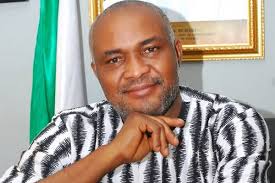
By Emmanuel Onwubiko
There was this Southern African proverb used by Nigeria’s former president Dr Goodluck Jonathan that makes a whole lot of sense to us in Nigeria, especially when analytically viewing how government business is set up.
The proverb says, “It’s much easier to wake a man who is truly asleep from sleep than he who is pretending to be asleep”. Flowing from this Southern African proverb is the fact that it is very difficult to get a government bent on doing that which is unconstitutional than from a self-correcting government that is transparent and open to criticism.
There are two public statements credited to the current president of Nigeria which self-contradict each other. The first one was the story the president told during his happy moments as he marked his birthday very recently.
Visited by an entourage organised by his minister of the Federal Capital Territory Mr. Nyesom Wike, President Bola Ahmed Tinubu said he once gave a strong warning to the FCT minister that he must carry out almost his entire public functions with the conscious awareness that the interest of All Progressives Congress which is the President’s political family matters so much and that should he be found wanting, he would be dismissed.
ALSO READ: NLC Shuts Down Ministry Of Mines Over 20-Year-Old Unlawful Dismissal
Wike is of the People’s Democratic Party but rebelled from his party and accepted a cabinet level appointment from the government set up by the APC led president.
The aforementioned story specifically is titled ‘How I warned Wike of possible sack if his policies didn’t favour APC in FCT – says Tinubu’.
The president had revealed that he threatened the Minister of the Federal Capital Territory (FCT), Nyesom Wike, that he could lose his position if his policies in Abuja did not favour the All Progressives Congress (APC).
Speaking recently when Wike led FCT residents on a Sallah visit to the State House, Tinubu commended the minister’s efforts in transforming the capital but noted that certain obstacles needed to be removed to ensure smooth progress.
One such challenge was the inclusion of the FCT under the Treasury Single Account (TSA), which Wike requested to be removed. Tinubu recalled that Wike approached him with the appeal.
“I remember the day Nyesom Wike came to me and said, ‘Please take us out of this problem of TSA so that I can do more work and achieve more,” Tinubu said.
He added that he asked Wike to outline his plans and then jokingly questioned whether the changes would benefit the APC politically.
“I said, ‘Okay, show me what you’re about to do,’ and he presented his thinking and his belief, and I threw in my political jibe. I said, ‘Will that give me any opportunity for my party to win an election in the FCT?’” the president added.
“I said, ‘I know where you’re coming from. Your own party or my party? Because if this thing goes too much in your own favour, you will lose your job, and he said, ‘Okay, we will settle that, my oga,’ and I moved ahead, and everything started changing rapidly,” Tinubu said.
He credited the removal of the FCT from the TSA for accelerating development and improving governance in the capital.
The second story was the statement that one of his ministers was offered appointment even when he was a known public critic of the person and politics of the president. In other word, the said minister is an outsider and not a core member of the president’s political family.
President Bola Tinubu had in this vein revealed the reasoning behind his “controversial decision” to appoint Dr. Bosun Tijani as Minister of Communications, Innovation, and Digital Economy.
This move, he said, drew widespread debate due to Tijani’s history of public criticism of him and the National Assembly.
Speaking at a special Iftar held on Saturday night at the Presidential Villa to mark his 73rd birthday, Tinubu stated that his choice of Tijani underscored his belief in recognising talent, even among critics, as a means to drive national development.
“When I picked him, it was tough. My very close confidantes, who had read his comments on social media, came to me and said, ‘No, never.’ I said, ‘Yes, he is talented.
“Because he criticises me and pours abuses on the parliament, it does not mean he has nothing to offer.
“Maybe his frustration at that time will drive him to contribute more to governance. And today, he is doing that, and I am very proud of him,” Tinubu stated.
These two public stories told by Tinubu gives two contradictions. One is the impression that the president is unaware of the fuller meaning of constitutional democracy which is a form of government that is voted into office, composed by the people, not necessarily by members of the political structure that produced the president and the government of the people by the people is legally obligated to then deliver services that would benefits the greatest majority or percentage of the people of the country and not registered members of the political party in which the president used to run for election into the office of the president of Nigeria.
This particular story of the encounter between Wike and Tinubu tells the story of a president who believes that only members of the All Progressives Congress must become members of his government and therefore should become the overwhelming beneficiaries of the programmes, policies and initiatives of the government. The very next story of how the president proceeded to pick someone outside of his political family and indeed a critic, as a cabinet level appointee, reflects the mindset of a president who knows that government isn’t necessarily by members of his political team and the beneficiaries of the policies and programmes of the government should be the greatest percentage of the people of Nigeria.
However, if we interrogate further the ways and manners of appointments made by the president, there is an open admission that President Tinubu is intentionally carrying on as if his government is by the APC and the goals and objectives of his governance style should be reaped by the members of his political family.
This is so because it is now obvious that 99 percent of all the appointments made by the president have favoured active members of All Progressives Congress and the intriguing thing about it is that key positions of board chairmen of important national agencies have been awarded to the National leaders and states wide leaders of Tinubu’s political party which is the All Progressives Congress. The Nigerian Television Authority’s board is chaired by the spokesman of the APC.
All federal teaching hospitals were awarded as trophies to national and state leaders of the All Progressives Congress and then there is another angle that is even more laughable: the overwhelming presence of the kinsmen and tribes women of Tinubu’s Yoruba heritage and ethnicity in his government.
Tinubu has effectively constituted the bulk of his appointees to be composed of Yorubas so much so that what we have with us in Nigeria is akin to a government by TRIBESMEN. This is more dangerous than concentrating appointments in the hands of leaders of the political party that produced the president of Nigeria, even though it is innately evil. So we are now contending with a twin social evils of having the president who has set up his government of TRIBESMEN and political family members only.
This is wrong on all fronts. I will reproduce the identities of the juicy and indeed very important public offices given only to Yorubas who are Tinubu’s TRIBESMEN. Senator Ali Ndume from Borno state, who is a member of the All Progressives Congress, loudly condemned this government by TRIBESMEN, which Tinubu is orchestrating.
But first, let us talk a bit about how tribalism constitutes the most dangerous threat to constitutional democracy.
A political philosopher recalled that Andrew Sullivan’s 2017 article “Can democracy survive tribalism” states what I would consider an idealist’s vision of Nigeria – “to live beyond such tribal identities, to construct a society based on the individual, to see ourselves as citizens of a people’s republic.”
Most scholars agree that tribalism is an inherited social construct, a default of our collective ‘existential experience.’ The implication is that tribalism in contemporary societies can not be wished away. Tribalism: “a loyalty or preference to one’s own people.” “The state of existing as a tribe, or a strong loyalty to your tribe.”
She said that a group’s history shapes its existential experience. Ahmad Mohammadpour and Kamal Soleimani (2019) suggest that “colonial powers have used tribalism to oversimplify the multifaceted modality of diverse and heterogeneous socio-political arrangements.” While understanding history is important, the popular anonymous quote, “If you don’t heal what hurt you, you’ll bleed on people who didn’t cut you,” captures the essence of the present moment in Nigeria.
What happened prior to Nigeria’s independence and post-independence has seared ‘tribe’ into the country’s political identity, fueling a ‘survivalist mentality’ and the need to ‘stick together.’ The extensive literature on tribalism agrees that it has more severe consequences in developing societies. Individuals may covertly stay ‘primal’ and overtly exhibit ‘primal’ behaviors when any form of security in an already ‘lacking, scarce’ space is threatened. Primal: the extreme response to new and threatening situations in the interest of self-preservation.
The author recalled vividly that with over 250 ethnic groups, Nigeria is the archetype of a heterogeneous group. However, this diversity also poses a burden, as the country’s institutions and leaders need help managing the complexities of the different groups. Despite being a rich economy, Nigeria’s poverty rate is high, and its quality of life is worsening. In the lead-up to the 2023 election, Nigeria’s economic situation was volatile, with high inflation, contractionary monetary policies, and shrinking policy space, leading to a reduced purchasing power for the average Nigerian.
Tribalism exacerbates the issue, as different groups compete for scarce resources. In his article “Tribalism and Politics in Nigeria,” Walter Schwarz (1966) wrote that “it is not that different tribes dislike each other. The trouble is they are competing for scarce commodities.” Today, 56 years after his writing, resource scarcity has worsened, and the competition for what is available is even more primal. (written by Ada Umenwaliri, PhD in public policy and strategy).
The conclusion is to reproduce empirical evidence to demonstrate our understanding that President Tinubu is running his government of TRIBESMEN, which is much more dangerous than his other understanding of government and purpose of government which to him means satisfying only the interest of members of his political party which is the All Progressives Congress (APC).
As sent to me by a senior officer of the Nigerian Immigration Service (name withheld): SOME OFFICIALS OF THE FEDERAL GOVERNMENT OF NIGERIA UNDER PRESIDENT TINUBU.
Mind you, this is a (non-exhaustive) list of Yorubas in the Government of President Tinubu. “YORUBA LOKAN”?
BOLA TINUBU’S FEDERAL GOVERNMENT:
- OFFICE/POSITION – President and Commander-in-Chief, Federal Republic of Nigeria. CURRENT OCCUPANT- Bola Ahmed Tinubu, TRIBE- Yoruba
- OFFICE/POSITION – Chief Justice of Nigeria, CURRENT OCCUPANT- Kudirat Motonmori Olatokunbo Kekere-Ekun, TRIBE- Yoruba
- OFFICE/POSITION – Chief of Army Staff, CURRENT OCCUPANT- Olufemi Olatubosun Oluyede, TRIBE- Yoruba
- OFFICE/POSITION – Inspector General of Police, CURRENT OCCUPANT- Kayode Egbetokun, TRIBE- Yoruba
- OFFICE/POSITION – DG, Department of State Services, CURRENT OCCUPANT- Adeola Oluwatosin Ajayi, TRIBE- Yoruba
- OFFICE/POSITION – Commander, Brigade of Guards, CURRENT OCCUPANT- Adebisi Olusola Onasanya, TRIBE- Yoruba
- OFFICE/POSITION – Chief of Defence Space Administration, CURRENT OCCUPANT- Lanre Ibrahim Oluwatoyin, TRIBE- Yoruba
- OFFICE/POSITION – Commandant, National Defence College
CURRENT OCCUPANT- Olumuyiwa Morankinyo Olotu
TRIBE- Yoruba - OFFICE/POSITION – CG, Nigeria Customs Service, CURRENT OCCUPANT- Bashir Adewale Adeniyi, TRIBE- Yoruba
- OFFICE/POSITION – CG, Federal Fire Service, CURRENT OCCUPANT- Abdulganiyu Olola Jaji, TRIBE- Yoruba
- OFFICE/POSITION- Accountant-General of the Federation, CURRENT OCCUPANT- Oluwatoyin Sakirat Madein, TRIBE- Yoruba
- OFFICE/POSITION- Governor, Central Bank of Nigeria, CURRENT OCCUPANT- Olayemi Michael Cardoso, TRIBE- Yoruba
- OFFICE/POSITION- Chairman, Economic & Financial Crimes Commission, CURRENT OCCUPANT- Olanipekun Olukoyede, TRIBE- Yoruba
- OFFICE/POSITION- Chairman, Federal Inland Revenue Service, CURRENT OCCUPANT- Zaccheus Adelabu Adedeji, TRIBE- Yoruba
- OFFICE/POSITION- CCE, Nigerian Upstream Petroleum Regulatory Commission, CURRENT OCCUPANT- Gbenga Komolafe, TRIBE- Yoruba
- OFFICE/POSITION- DG/CEO, Nigerian Maritime Administration and Safety Agency, CURRENT OCCUPANT- Dayo Mobereola, TRIBE- Yoruba
- OFFICE/POSITION- MD/CEO, Asset Management Corporation of Nigeria, CURRENT OCCUPANT- Gbenga Alade, TRIBE- Yoruba
- OFFICE/POSITION- DG, National Pension Commission, CURRENT OCCUPANT- Omolola Bridget Oloworaran, TRIBE- Yoruba
- OFFICE/POSITION- DG, Bureau of Public Procurement, CURRENT OCCUPANT- Adebowale Adedokun, TRIBE- Yoruba
- OFFICE/POSITION- MD/CEO, Federal Airports Authority of Nigeria, CURRENT OCCUPANT- Olubunmi Oluwaseun Kuku, TRIBE- Yoruba
- OFFICE/POSITION- DG, Bureau of Public Enterprises, CURRENT OCCUPANT- Ayodeji Ariyo Gbeleyi, TRIBE- Yoruba
- OFFICE/POSITION- MD/CEO, Nigeria Export Processing Zones Authority, CURRENT OCCUPANT- Olufemi Ogunyemi, TRIBE- Yoruba
- OFFICE/POSITION- Commissioner/CEO, National Insurance Commission, CURRENT OCCUPANT- Olusegun Ayo Omosehin, TRIBE- Yoruba
- OFFICE/POSITION- DG/CEO, National Identity Management Commission, CURRENT OCCUPANT- Abisoye Coker-Odusote, TRIBE- Yoruba
- OFFICE/POSITION- DG/CEO, National Space Research and Development Agency, CURRENT OCCUPANT- Mathew Adepoju, TRIBE- Yoruba
- OFFICE/POSITION- DG/CEO, National Centre for Technology Management, CURRENT OCCUPANT- Olushola Odusanya, TRIBE- Yoruba
- OFFICE/POSITION- DG/CEO, National Automotive Design and Development Council, CURRENT OCCUPANT- Oluwemimo Joseph Osanipin, TRIBE- Yoruba
- OFFICE/POSITION- Chairman, Nigerian Ports Authority Board, CURRENT OCCUPANT- Adedayo Clement Adeyeye, TRIBE- Yoruba
- OFFICE/POSITION- MD, Federal Housing Authority, CURRENT OCCUPANT- Oladimeji Oyetunde Ojo, TRIBE- Yoruba
- OFFICE/POSITION- ES, National Lottery Trust Fund, CURRENT OCCUPANT- Tosin Adeyanju, TRIBE- Yoruba
- OFFICE/POSITION- DG/CEO, National Lottery Regulatory Commission, CURRENT OCCUPANT- Lanre Gbajabiamila, TRIBE- Yoruba
- OFFICE/POSITION- CEO, Nigerian Postal Service
CURRENT OCCUPANT- Omotola Odeyemi, TRIBE- Yoruba - OFFICE/POSITION- CEO, Nigeria Data Protection Commission, CURRENT OCCUPANT- Vincent Olatunji, TRIBE- Yoruba
- OFFICE/POSITION- MD/CEO, Galaxy Backbone Limited, CURRENT OCCUPANT- Ibrahim Adepoju Adeyanju, TRIBE- Yoruba
- OFFICE/POSITION- DG/CEO, National Biosafety Management Agency, CURRENT OCCUPANT- Agnes Yemisi Asagbra, TRIBE- Yoruba
- OFFICE/POSITION- DG, National Agency for the Control of AIDS, CURRENT OCCUPANT- Temitope Ilori, TRIBE- Yoruba
- OFFICE/POSITION- DG, National Agency for Food and Drug Administration and Control, CURRENT OCCUPANT- Mojisola Christianah Adeyeye, TRIBE- Yoruba
- OFFICE/POSITION- ES/CEO, National Primary Health Care Development Agency, CURRENT OCCUPANT- Muyi Aina, TRIBE- Yoruba
- OFFICE/POSITION- DG, Nigeria Centre for Disease Control, CURRENT OCCUPANT- Jide Idris, TRIBE- Yoruba
- OFFICE/POSITION- Statistician-General, National Bureau of Statistics, CURRENT OCCUPANT- Adeyemi Adeniran, TRIBE- Yoruba
- OFFICE/POSITION- ES, National Sugar Development Council, CURRENT OCCUPANT- Kamar Bakrin, TRIBE- Yoruba
- OFFICE/POSITION- DG/CEO, Advertising Regulatory Council of Nigeria, CURRENT OCCUPANT- Lekan Fadolapo, TRIBE- Yoruba
- OFFICE/POSITION- EVC/CEO, Federal Competition & Consumer Protection Commission, CURRENT OCCUPANT- Olatunji Bello, TRIBE- Yoruba
- OFFICE/POSITION- National Coordinator, National Social Safety-Net Coordinating Office, CURRENT OCCUPANT- Funmi Olotu, TRIBE- Yoruba
- OFFICE/POSITION- DG, National Sports Commission, CURRENT OCCUPANT- Bukola Olawale Olopade, TRIBE- Yoruba
- OFFICE/POSITION- DG, Nigerian Tourism Development Corporation, CURRENT OCCUPANT- Folorunsho Coker, TRIBE- Yoruba
- OFFICE/POSITION- DG/CEO, National Orientation Agency, CURRENT OCCUPANT- Lanre Issa-Onilu, TRIBE- Yoruba
- OFFICE/POSITION- Registrar Surveyors Council of Nigeria. CURRENT OCCUPANT- Olakunle Olugbemiro, TRIBE- Yoruba
- OFFICE/POSITION- President/CEO Digital Bridge Institute, CURRENT OCCUPANT- Opeyemi Dele-Ajayi, TRIBE- Yoruba
- OFFICE/POSITION- DG/CEO Industrial Training Fund, CURRENT OCCUPANT- Oluwatoyin Afiz Ogun, TRIBE- Yoruba
- OFFICE/POSITION- DG/CEO Nigerian Institute of Medical Research, CURRENT OCCUPANT- John Oladapo Obafunwa, TRIBE- Yoruba
- OFFICE/POSITION- DG/CEO National Institute for Hospitality Tourism, CURRENT OCCUPANT- Abisoye Fagade, TRIBE- Yoruba
- OFFICE/POSITION- National Power Training Institute of Nigeria, CURRENT OCCUPANT- Ahmed Bolaji Nagode, TRIBE- Yoruba
- OFFICE/POSITION- DG National Institute for Policy and Strategic Studies, CURRENT OCCUPANT- Ayo Omotayo, TRIBE- Yoruba
- OFFICE/POSITION- Administrator/CEO Public Service Institute of Nigeria, CURRENT OCCUPANT- Abdul-Ganiyu Obatoyinbo, TRIBE- Yoruba
- OFFICE/POSITION- Registrar Joint Admissions and Matriculation Board, CURRENT OCCUPANT- Is-haq Olanrewaju Oloyede, TRIBE- Yoruba
- OFFICE/POSITION- Registrar/CEO Teachers Registration Council of Nigeria, CURRENT OCCUPANT- Josiah Ajiboye, TRIBE- Yoruba
- OFFICE/POSITION- MD/CEO Nigerian Education Loan Fund, CURRENT OCCUPANT- Akintunde Sawyerr, TRIBE- Yoruba
- OFFICE/POSITION- ED/CEO Cocoa Research Institute of Nigeria, CURRENT OCCUPANT- Patrick Olusanmi Adebola, TRIBE- Yoruba
- OFFICE/POSITION- MD/CEO Nigerian Agricultural Insurance Corporation, CURRENT OCCUPANT- Folashade Joseph, TRIBE- Yoruba
- OFFICE/POSITION- Minister of Petroleum Resources, CURRENT OCCUPANT- Bola Ahmed Tinubu, TRIBE- Yoruba
- OFFICE/POSITION- Minister of Finance and Coordinating Minister of the Economy, CURRENT OCCUPANT- Wale Edun, TRIBE- Yoruba
- OFFICE/POSITION- Minister of Interior, CURRENT OCCUPANT- Olubunmi Tunji-Ojo, TRIBE- Yoruba
- OFFICE/POSITION- Attorney General of the Federation and Minister of Justice, CURRENT OCCUPANT- Lateef Fagbemi, TRIBE- Yoruba
- OFFICE/POSITION- Minister of Power, CURRENT OCCUPANT- Adebayo Adelabu TRIBE- Yoruba
- OFFICE/POSITION- Minister of Solid Minerals Development, CURRENT OCCUPANT- Dele Alake, TRIBE- Yoruba
- OFFICE/POSITION- Minister of Communications, Innovation and Digital Economy, CURRENT OCCUPANT- Bosun Tijani, TRIBE- Yoruba
- OFFICE/POSITION- Minister of Marine and Blue Economy, CURRENT OCCUPANT- Adegboyega Oyetola
TRIBE- Yoruba - OFFICE/POSITION- Minister of Industry, Trade and Investment, CURRENT OCCUPANT- Jumoke Oduwole, TRIBE- Yoruba
- OFFICE/POSITION- Minister of Education, CURRENT OCCUPANT- Morufu Olatunji Alausa, TRIBE- Yoruba
- OFFICE/POSITION- Minister for Youth Development, CURRENT OCCUPANT- Ayodele Olawande, TRIBE- Yoruba
- OFFICE/POSITION- Minister of State, Health, CURRENT OCCUPANT- Salako Iziaq Adekunle Adeboye, TRIBE- Yoruba.
Emmanuel Onwubiko, the founder of the Human Rights Writers Association Of Nigeria (HURIWA), formerly the National Commissioner of the National Human Rights Commission of Nigeria, wrote from Abuja
Opinion/Feature
Okpebholo: Because I Am Involved
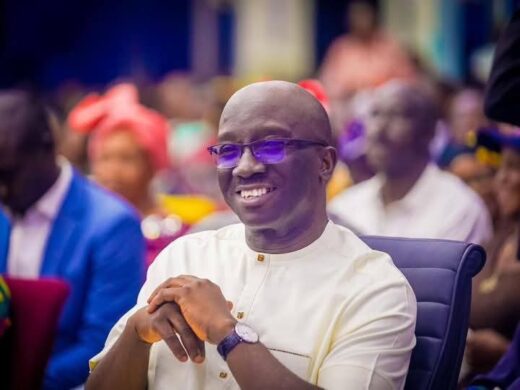
By Fred Itua
At every defining moment in a nation’s journey, the call to give account of stewardship becomes not just necessary but inevitable.
This duty is more profound for those whom providence has favoured to sit at the helm, guiding the affairs of the state and shaping the future of the people. In 1989, the late Ikemba Nnewi, Chukwuemeka Odumegwu Ojukwu, published ‘Because I Am Involved’, a 208-page introspective chronicle that offered a gripping account of his political convictions, nationalist ideals, reflections on Nigeria’s unrealised potentials, and the personal sacrifices he made for a country he so deeply loved.
In that same spirit, this article borrows its title and energy from Ojukwu’s classic. ‘Because I Am Involved’, is not merely a declaration; it is a commitment.
Today, in Edo State, Governor Monday Okpebholo personifies that commitment. Since he assumed office, it is no longer business as usual. The tides have shifted, and the wheels of governance are now being turned by a sense of duty, urgency, and resolve.
ALSO READ: Leadership Bestows Person Of The Year Award On Dangote
Because Gov Okpebholo is involved, educational transformation is underway, and a solid foundation is being built for tomorrow’s leaders.
Gov Okpebholo’s approach to education is holistic and strategic. His administration is actively implementing a three-pronged intervention model: infrastructure, manpower, and pedagogy.
Firstly, several dilapidated schools across the three senatorial districts are undergoing comprehensive rehabilitation to create safe and conducive learning environments.
Secondly, the recruitment of qualified teachers is ongoing to plug manpower deficits in critical subjects.
Thirdly, the retraining and retooling of educators is being carried out to align teaching methodologies with 21st-century pedagogical standards, including digital literacy and learner-centered techniques.
Because he is involved, agriculture has received unprecedented attention.
Gov Okpebholo’s administration has significantly increased budgetary allocation to the agricultural sector. Over 3,000 hectares of arable farmland are being cultivated under various agricultural empowerment initiatives.
Beyond mere cultivation, partnerships with private investors are being explored to establish agro-processing hubs that will reduce post-harvest losses, promote value addition, and create employment opportunities, especially for youth and women in rural areas.
Gov Okpebholo has embarked on an ambitious infrastructural renewal program, particularly in road construction.
His administration has flagged off several strategic road projects that serve as vital arteries, linking communities, enhancing commerce, and easing transportation.
Among these are the Ekpoma-Uromi-Ubiaja Road and the Uromi-Onewa-Udomi-Ibhiolulu-Afuda-Idumoza axis, all crucial to inter-community trade. Urban renewal projects in Benin City are also receiving a facelift, with several roads being re-asphalted, drainages reconstructed, and streetlights installed for enhanced security and aesthetics.
Because he is involved, security is being tackled both in policy and practice.
Gov Okpebholo has led the enactment of anti-cultism and anti-kidnapping laws to strengthen the legal framework for fighting insecurity. Complementing this legislative stance is the purchase of thousands of operational vehicles and logistics support for the Nigeria Police and other security agencies across the state.
Community policing structures are being revived, and a feedback mechanism has been introduced where citizens can report threats anonymously to a centralized command center.
In the health sector, the renovation of primary health care centers and recruitment of frontline health workers have been intensified.
Gov Okpebholo’s administration is also working toward the expansion of the Edo Health Insurance Scheme to cover more vulnerable populations.
His interest in digital governance is birthing innovations that streamline internal processes, curb leakages, and promote transparency. This includes the digitization of land administration, tax payments, and record-keeping for government workers.
Ojukwu once wrote, “I do not seek to please, I seek to serve.”_ Gov Okpebholo, through his visible and people-centered governance, has made it clear: he is not in power for fanfare or personal gain. He is in office because he is involved — involved in the pains of his people, the cries of rural dwellers, the frustrations of commuters, the dreams of schoolchildren, and the aspirations of a new Edo State.
The journey is not without its challenges, but one truth is undeniable: under Gov Okpebholo, Edo State is no longer on autopilot. There is direction. There is purpose. Above all, there is involvement.
Fred Itua, the Chief Press Secretary to the Edo State Governor, wrote from Benin City, Edo State.
Opinion/Feature
Securing Edo State: Gov Okpebholo’s Unwavering Fight Against Crime

By Fred Itua
Crime is a fundamental threat to societal stability, and in Edo State, it has manifested in various troubling forms — ranging from kidnapping and cult-related violence to armed robbery and illegal land grabbing.
For years, criminal elements have terrorized communities, disrupted businesses, and put lives at risk. The inefficiency of past administrations allowed insecurity to fester, exemplified by incidents such as the kidnapping of Anthony Aziegbemi, chairman of the opposition Peoples Democratic Party (PDP), while the PDP was in power. This highlighted the failure of past security measures and underscored that insecurity did not start today.
ALSO READ: Atiku Decries Declaration Of State Of Emergency In Rivers State
Since assuming office, Governor Monday Okpebholo has demonstrated an unwavering commitment to tackling crime head-on. Through a well-coordinated security strategy, his administration has empowered law enforcement agencies, revitalized community-based security networks, and upgraded infrastructure to enhance public safety. His approach is strategic, pragmatic, and people-focused, combining intelligence-driven policing, community engagement, and infrastructural investment to make Edo safer for residents, investors, and visitors alike.
One of the key pillars of Governor Okpebholo’s security strategy is strengthening Edo State’s security architecture. His administration has prioritized equipping law enforcement agencies with the necessary tools to combat crime effectively. This includes providing operational vehicles, advanced communication gadgets, and logistical support to enhance rapid response capabilities. Additionally, the government has revitalized and funded security task forces, particularly those focused on kidnapping, cultism, and armed robbery.
Under his leadership, there has been a sustained crackdown on criminal syndicates operating in the state. Reports indicate that several notorious kidnappers have been arrested, and many victims have been rescued due to swift, coordinated security operations.
The Edo State Security Network (ESSN) has been strengthened, with local vigilante groups complementing the police in intelligence gathering and crime prevention. This multi-layered approach has yielded tangible results, with multiple high-profile arrests recorded in recent months.
Governor Okpebholo’s administration has intensified operations in known crime hotspots. The Special Anti-Kidnapping Task Force has launched aggressive operations along notorious routes such as the Benin-Auchi Road, the Benin-Lagos Expressway, and the Ekpoma-Irrua axis—areas previously plagued by rampant kidnappings. These efforts have dismantled criminal hideouts, leading to the successful rescue of abducted victims and the arrest of key figures behind major kidnapping syndicates.
The Edo State Police Command, in collaboration with the Department of State Services (DSS) and the Nigerian Army, has equally stepped up efforts to neutralize criminal networks. Notable successes include the dismantling of a major kidnapping ring operating in Orhionmwon and Uhunmwonde local government areas, which led to multiple arrests and the recovery of sophisticated weapons.
Similarly, recent raids on cult hideouts in Benin City, Ekpoma, and Auchi resulted in over 50 suspected cultists being apprehended, significantly reducing inter-cult clashes and violent reprisals.
Recognizing the persistent challenge of cult-related violence in Edo State, Governor Okpebholo has implemented a zero-tolerance policy on cultism. In the past, cult clashes led to loss of lives and destruction of property, but security operatives now have clear directives to arrest and prosecute those involved in cult-related violence. Beyond enforcement, the administration has engaged youth organizations, religious leaders, and community elders in peace-building efforts to rehabilitate and reintegrate misguided youths into society.
The government has also taken decisive action against illegal land-grabbing, particularly in Ikpoba-Okha, Oredo, and Egor local government areas. Criminal cartels that previously extorted landowners are being dismantled, restoring confidence in Edo’s property sector and protecting rightful landowners from exploitation.
Governor Okpebholo understands that security cannot be sustained through policing alone. His administration has actively involved traditional rulers, local vigilante groups, and town unions in crime prevention. The Edo State Security Corps has played a crucial role in intelligence gathering and rapid response, particularly in rural areas. Their collaboration with law enforcement agencies has led to increased arrests and a drastic reduction in rural crime rates.
Beyond law enforcement, the government recognizes that economic empowerment is a vital tool in crime prevention. Unemployment remains a major driver of criminal activity, and the administration is addressing this by attracting investments and implementing youth empowerment programs. By focusing on industrialization, agribusiness, and entrepreneurship, the government is reducing the number of idle youths vulnerable to criminal recruitment. Additionally, vocational training and education initiatives are equipping young people with skills that provide them with legitimate sources of income.
While the government has shown commendable leadership in tackling insecurity, lasting success requires collective responsibility. Security is not just the duty of the police or the government — it is a shared commitment that involves every citizen, traditional ruler, religious leader, and community member.
For Edo to achieve sustainable security, community members must actively report suspicious activities and resist shielding criminals under the guise of “protecting our own.”
Traditional rulers and local chiefs must work closely with security agencies to maintain peace within their domains. The judiciary must ensure that criminal cases are handled swiftly and fairly to deter potential offenders. Religious organizations and civil society groups should intensify awareness campaigns promoting non-violence, youth empowerment, and the dangers of criminal activities. The private sector can also support security initiatives by investing in community policing, surveillance systems, and social interventions.
Governor Monday Okpebholo’s determined fight against crime is yielding measurable results. His administration’s strategic initiatives—ranging from strengthening security task forces and cracking down on kidnappers and cultists to investing in job creation and infrastructure—are laying the foundation for a safer and more prosperous Edo State.
However, the fight against crime is not for the government alone. Every Edo resident has a role to play in sustaining the progress made. By working together, Edo State can become a model of security and development—a place where businesses flourish, communities thrive, and families live without fear. The government has set the pace, but it is now up to all stakeholders to consolidate these efforts. The time to act is now.
Itua, the Chief Press Secretary to Edo State Governor, wrote from Benin City.



